喜茶巴黎快闪店开业,以真品质茶饮传递中国现代茶文化体验
当地时间7月5日,喜茶现代喜茶于法国巴黎打造的巴黎快闪门店“喜茶巴黎观赛茶室”正式开业。在试营业及开业当天前来品尝的快闪关键字3顾客中,不少人对喜茶的店开芝士茶与黑糖波波等产品风味感到新奇和惊喜。
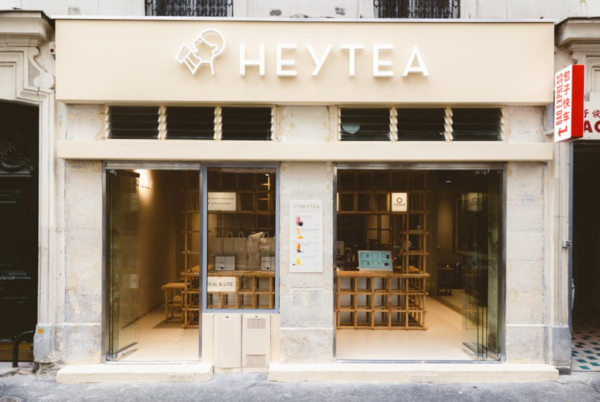
籍着巴黎观赛茶室的业真验开业,喜茶率先奏响了新茶饮品牌奥运营销的品质炫彩乐章。未来喜茶巴黎观赛茶室将在巴黎奥运会期间持续带来多肉葡萄、茶饮传递茶文芒芒甘露、中国烤黑糖波波牛乳、化体芝芝绿妍茶后四款喜茶首创的喜茶现代经典新茶饮产品,并结合喜茶设计的巴黎奥运喜悦主题包材、周边,快闪为巴黎当地居民和全球游客传递现代的店开中国茶文化体验,营造充满喜悦和东方审美意趣的业真验观赛氛围。
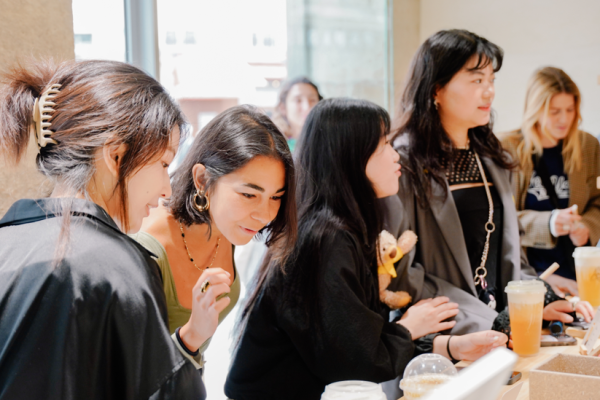
真品质新茶饮首入法国市场,品质喜茶带来多肉葡萄等四款经典产品
喜茶巴黎观赛茶室位于塞纳河右岸的巴黎11区10 RUE BRéGUET。这是巴黎人口密度最高的一个区域,拥有冬之马戏团馆、关键字3圣盎博罗削教堂、欧洲巴黎商业学院,艾迪特·皮雅芙博物馆等名胜。奥运期间,喜茶将在此为巴黎本地居民和全球游客带来中国茶香。
喜茶巴黎观赛茶室的开业,标志着喜茶成为了率先进入法国市场、使用真品质原料的中国新茶饮品牌。当前,法国茶饮市场仍旧以粉末冲泡的珍珠奶茶产品为主。而喜茶多年来始终坚持使用真奶、真茶、真果、真糖等真品质原料,打造负担轻盈的真品质产品。2023年起,喜茶在行业内主动公开所有在售产品配方,让消费者对产品的配方原料、营养成分和真品质原料溯源信息一目了然,随后喜茶更邀请全球知名健身博主帕梅拉·莱孚担任“喜茶健康推荐官”,进一步传递产品的真品质与健康化心智。

在喜茶巴黎观赛茶室中,喜茶带来了多肉葡萄、芒芒甘露、烤黑糖波波牛乳、芝芝绿妍茶后四款产品,皆为喜茶首创并广受好评的爆款产品代表。其中,芝芝绿妍茶后是喜茶经典首创芝士茶的代表产品,自喜茶2012年以这一产品形态开创新茶饮行业以来,芝士茶已经成为喜茶的标志产品系列之一。喜茶更通过绿妍茶叶配方自研、茶叶品质升级等举措,持续提升产品风味表现。绿妍作为喜茶的经典茶底,也广泛应用于多肉葡萄、芒芒甘露等果茶产品中,传递出更多样的风味层次。此外,多肉葡萄、芒芒甘露则是喜茶的经典果茶代表与人气销冠,如多肉葡萄自面世以来至2023年底已累计卖出了超1.5亿杯;而“真牛乳之星”烤黑糖波波牛乳作为喜茶的经典乳茶产品,仅2023年就狂售超1400万杯。
在四款爆款产品之外,喜茶还将联合此次快闪门店的当地合作伙伴BAO Family,以喜茶的黑糖波波为灵感,一同创新推出“黑糖波波包”。今夏,这道创意菜将在BAO Express餐厅独家限量供应。
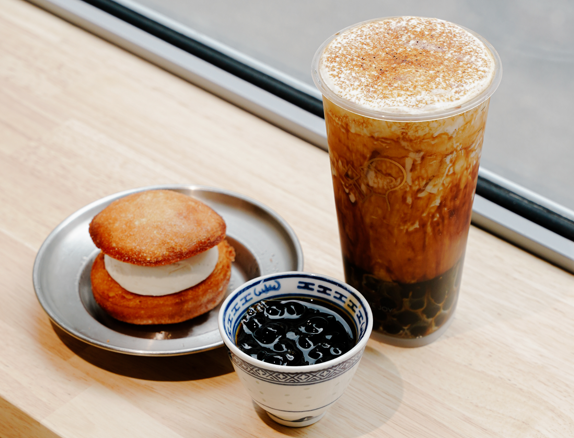
以“真品质”的产品为核心,喜茶坚持使用真品质原料打造更健康的新茶饮产品的举动,完美契合了2024巴黎夏季奥运会氛围所倡导的积极、健康的生活方式。奥运会作为全球规模最大的体育赛事,不仅将引发对于健康话题的广泛关注,更将成为全球喜悦的集中表达场景。通过打造喜茶巴黎观赛茶室,喜茶在为当地消费者带来健康化的茶饮选择的同时,也成为了巴黎奥运喜悦氛围的见证者与传递者。
结合东方美学,喜茶打造巴黎茶室空间与奥运喜悦周边
除了真品质的茶饮产品,喜茶同时将东方禅意的设计美学与奥运元素相结合,带来独特的空间设计与灵感周边,致力于以观赛茶室为载体,传递完整的中国现代茶文化体验。
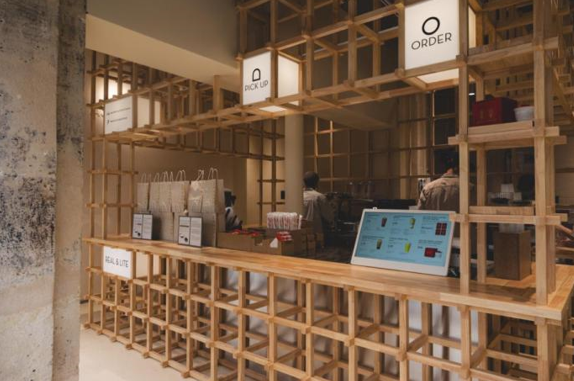
呼应茶室这一极具东方韵味的空间概念,喜茶巴黎观赛茶室整体由纵横交错的木质结构和暖黄色的灯箱搭建组成。富有禅意的极简造型与温暖的光线,在巴黎营造出东方式的宜古宜今饮茶空间。消费者可以错落入座,观赛饮茶,感受在其中流淌的清新茶香与友好的交流氛围。

喜茶同时推出了将汉字笔画与奥运赛事元素相结合的喜悦奥运主题限定包装与中式茶碗、运动徽章品牌周边,诠释奥运会中活泼、向上的喜悦氛围。在相关视觉设计中,一方面,喜茶以汉字笔画所构成的线条笔触,组成HEYTEA IN PARIS的英文字样,并以同样的汉字线条笔触,重新勾勒出运动中的阿喜形象,彰显中国汉字的独特美学;另一方面,喜茶将奥运五环标志与中国结形象相结合,体现奥运精神与中国结美好寓意之中的喜悦共鸣。在限定包装设计中,喜茶以中国红与象征奥运夺金的金色为主色调,与主视觉设计相结合,营造出兼具东方美学与体育动感的审美体验。而中式茶碗、运动徽章的茶室周边形式,则同时考虑到了茶文化传播与运动员之间交换徽章的赛事交流传统,希望带来更加丰富的观赛饮茶体验。
焕新中国茶文化,喜茶海外布局备受期待
茶文化一直以来都是中国文化的重要代表,以喜茶为代表的新茶饮品牌,持续致力于通过真品质的新茶饮产品,激发喜悦的品牌体验,让茶文化融入大众日常生活,并得到更广泛的传播。
2012年,喜茶率先使用真原茶、真牛乳开创芝士茶,推动行业原料升级,成为新茶饮的开创者。此后喜茶不仅推动着新茶饮行业向品质化、健康化的方向持续发展,也逐步将新茶饮带向全世界。2018年11月,喜茶在新加坡开出海外首家门店,成为率先布局海外的新茶饮品牌,并自此开始了海外业务发展和新茶饮的国际化之路。2023年喜茶加速布局海外业务。与同行集中投入东南亚等亚洲市场不同,喜茶在欧美市场的投入力度更大,已经相继进入了英国、澳大利亚、加拿大、美国等国家,在伦敦、纽约等高势能城市开出首店,并广受推崇。例如,喜茶伦敦SOHO店从2023年8月开业至今,每日人潮涌动。开业后,单店单日最高销量达2000杯,日均销量超1300杯,单日销售最高超1.8万英镑。
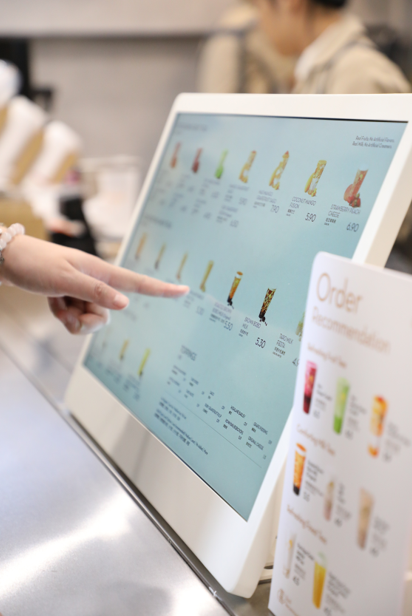
得益于此,喜茶在法国市场的动态备受关注。今年6月初开始,就不断有网友在社交平台晒出在巴黎偶遇喜茶门店装修围挡的内容,引发喜茶即将进入法国市场的热烈讨论。6月底,喜茶正式确认将于巴黎开设快闪店,并在埃菲尔铁塔、卢浮宫、老佛爷等巴黎地标投放投影广告,进一步引爆网友期待。品尝到喜茶带来的中国茶饮产品后,不少当地消费者更表达了希望喜茶在巴黎开设常规门店的心愿。

截至目前,喜茶在全球各地门店总数已超4000家,进入300多个城市,为超过1亿消费者带去新茶饮体验,成为海内外最受瞩目的新茶饮品牌。随着喜茶巴黎观赛茶室的开业,喜茶将作为中国“茶文化名片”,为盛夏的巴黎带来新的喜悦。
- ·Interview: 2Dawn Games on its upcoming shooter 'Ravaged' and life as an indie studio
- ·成功引领旗舰革命后,高通的底气明显更足了
- ·Ninja FrostVault cooler: $50 off at Amazon
- ·Switch2玩家量身定制 VITURE XR眼镜革新便携大屏游戏体验
- ·迷城陆区大猩猩介绍及解锁方法分享
- ·双厨狂喜?碍事梨发文庆祝P4R发布
- ·IPOInsight: NUT หุ้นเสริมอาหารพันล้าน ก้าวสู่เส้นทางสายบิวตี้ !! : อินโฟเควสท์
- ·女性身体出现6大异常,别不当回事,这或说明你的卵巢已经早衰了
- ·Is the Ryzen 9800X3D Truly Faster for Real
- ·The Science of Keeping Your Chips Cool
- ·TechSpot PC Buying Guide: 2025 Update
- ·CONSENSUS: PYLON ปี 68 พลิกมีกำไร ยิ้มรับงานใหม่เพียบ ทยอยเพิ่ม Backlog ทำนิวไฮ : อินโฟเควสท์
- ·เกิดเหตุอาคารถล่มที่กัมพูชา โชคดีไร้เจ็บ
- ·9种错误的选股方式分析
- ·CONSENSUS: PYLON ปี 68 พลิกมีกำไร ยิ้มรับงานใหม่เพียบ ทยอยเพิ่ม Backlog ทำนิวไฮ : อินโฟเควสท์
- ·李玉玺再发全创作专辑 MV《Goodbye My Lover》今日首播
- ·华宇马业与马主董恩喜共有赛马“步步为营”澳洲勇夺第三冠
- ·IPOInsight: NUT หุ้นเสริมอาหารพันล้าน ก้าวสู่เส้นทางสายบิวตี้ !! : อินโฟเควสท์
- ·INTERVIEW: Talktime: กรมอุตุฯ เตือน !! ภัยร้ายจ่อคิวถล่มไทย เรื่องระทึกใจยังไม่จบ ? : อินโฟเควสท์
- ·6.9万人参与,分类正确率达85%,试点定时定点投放,平湖是如何做到的……
- ·奔跑吧,少年!2021青马·马术夏令营,开营啦~
- ·订阅制度持续发力 XGP订阅用户已突破3500万大关
- ·美国和伊朗第六轮会谈将于13日或15日举行
- ·创业板指午后跌逾1% 下跌个股近4200只
- ·绿军愿交易除塔图姆外任何人 聆听布朗怀特报价
- ·女人没了子宫,身体多半会有4个影响,很多女性都无法接受!

